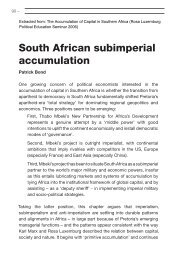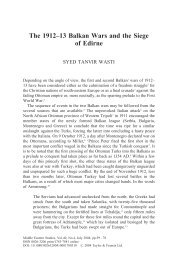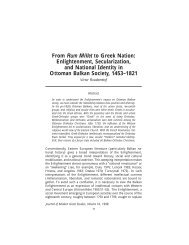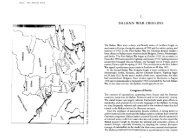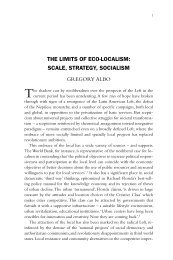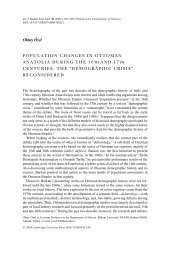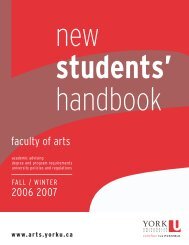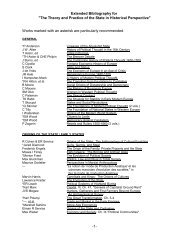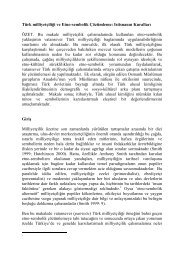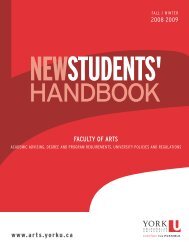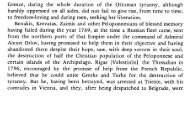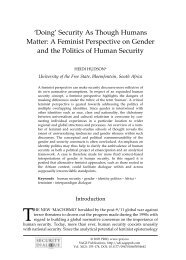FYCSG 05/06 REV2 - Faculty of Arts - York University
FYCSG 05/06 REV2 - Faculty of Arts - York University
FYCSG 05/06 REV2 - Faculty of Arts - York University
Create successful ePaper yourself
Turn your PDF publications into a flip-book with our unique Google optimized e-Paper software.
African Studies<br />
The purpose <strong>of</strong> this program is to enable students to pursue their interests in Africa<br />
through a series <strong>of</strong> departmental and divisional courses <strong>of</strong>fering a variety <strong>of</strong> approaches<br />
to the area. African Studies also enables students to apply their knowledge <strong>of</strong> a specific<br />
discipline to the study <strong>of</strong> Africa. Our thematic concerns and our diversity <strong>of</strong> course <strong>of</strong>ferings,<br />
together with the program’s concern for the material and cultural well being <strong>of</strong> the<br />
people <strong>of</strong> Africa, constitute an exciting, interdisciplinary enquiry into Africa’s historic<br />
and contemporary role in world affairs.<br />
African Studies is available as an Honours (Double Major) Program or as an Honours<br />
(Minor) Program. After the completion <strong>of</strong> 24 credits, African Studies majors will take the<br />
core course, AS/SOSC2480 9.0 Introduction to African Studies* (Note: 6 credits <strong>of</strong> this<br />
course will count towards the African Studies major). This course deals with five major<br />
themes: Africa’s social organization and cultural heritage; the history <strong>of</strong> Africa’s conquest<br />
in the eras <strong>of</strong> slavery and colonialism; the struggle to create economically and politically<br />
viable nation-states in the post-colonial era; gender relations in the past and present; and<br />
African social thought. These major themes also constitute reference points for other and<br />
more detailed contributions from the participating departments and divisions.<br />
Students considering the African Studies program as a Major or Minor should consider<br />
enrolling in at least one <strong>of</strong> the following courses in their first year.<br />
AS/ANTH1110 6.0 Introduction to Social Anthropology (not for credit towards African<br />
Studies)<br />
AS/GEOG1000 6.0 Introduction to World Geography (not for credit towards African<br />
Studies)<br />
AS/HIST1010 6.0 War, Revolution and Society (not for credit towards African Studies)<br />
SUGGESTED COURSE SELECTION FOR FIRST YEAR.<br />
(ASSUMES A COURSE LOAD OF 30 CREDITS):<br />
• 1000-level 9 credit Foundations HUMA course;<br />
• Introductory course towards Major 1 (usually 6 credits);<br />
• AS/ANTH1110 6.0 or AS/GEOG1000 6.0 or AS/HIST1010 6.0 (as suggested above);<br />
• 1000-level 6 credit NATS course;<br />
• 3 credit elective course (optional).<br />
Anthropology<br />
Anthropology provides an opportunity to study a diverse range <strong>of</strong> social and cultural<br />
topics (such as race, globalization, violence, gender, sexuality, medicine, religion and<br />
media) within a relational framework. The program provides the critical analytic tools<br />
necessary to understand our place in the social and cultural diversity <strong>of</strong> the world, past<br />
and present. The Anthropology program <strong>of</strong>fers a number <strong>of</strong> degree options for majors,<br />
minors, and combined programs.<br />
AS/ANTH1110 6.0 Introduction to Social Anthropology. An introduction to anthropology<br />
from the perspectives acquired through comparative study <strong>of</strong> societies. The<br />
course will illustrate both the diversity and the recurring principles <strong>of</strong> social behaviour.<br />
Topics will include economic organization, kinship patterns, political and legal systems,<br />
and ritual and religion.<br />
SUGGESTED COURSE SELECTION FOR FIRST YEAR.<br />
(ASSUMES A COURSE LOAD OF 30 CREDITS):<br />
• 1000-level 9 credit Foundations HUMA or SOSC course;<br />
• AS/ANTH1110 6.0;<br />
• 1000-level 6 credit NATS course;<br />
• 6 credit elective course;<br />
• 3 credit elective course (optional).<br />
Business and Society<br />
The program in Business and Society provides the opportunity to study the impact <strong>of</strong> business<br />
on society and the relations between business, social structures and patterns, and<br />
government. The program combines courses that provide the analytical tools necessary<br />
to study and research business and society with courses that focus on the political,<br />
social, and cultural context <strong>of</strong> business, both in Canada and in the global system.<br />
Students are required to choose two streams from the following areas <strong>of</strong> study:<br />
• Economics<br />
• Environmental Studies<br />
• Geography<br />
• History<br />
• Mathematics and Statistics<br />
• Political Science<br />
• Psychology<br />
• Social Science (Labour Studies)<br />
• Sociology<br />
The following are courses students should take in the first and second year <strong>of</strong> the<br />
Business and Society Program.<br />
CORE COURSES WHICH SHOULD BE TAKEN IN FIRST YEAR:<br />
AS/ECON1000 3.0 Introduction to Microeconomics. An introduction to the principles<br />
and methods <strong>of</strong> economics, with emphasis on microeconomic theory. Topics include<br />
the theory <strong>of</strong> markets, price determination, and the theory <strong>of</strong> the firm.<br />
AS/ECON1010 3.0 Introduction to Macroeconomics. An introduction to the principles<br />
and methods <strong>of</strong> economics with emphasis on macroeconomic theory. Topics include<br />
the theory <strong>of</strong> money and banking, the theory <strong>of</strong> international trade and finance, and<br />
the economic analysis <strong>of</strong> such selected topics as unemployment, inflation, and government<br />
budget policy.<br />
AS/SOSC1340 3.0 Introduction to Business and Society. This course introduces major<br />
themes in the field <strong>of</strong> business and society, including various theoretical approaches<br />
and concepts. Particular attention is paid to specific historical developments in the<br />
rise <strong>of</strong> the capitalist economy, and the social transformations associated with these<br />
developments.<br />
Note: Will not fulfill Foundations requirement. Limited space available to non-Business<br />
and Society majors.<br />
CORE COURSES WHICH SHOULD BE TAKEN IN SECOND YEAR:<br />
AS/CSE1520 3.0 Computer Use: Fundamentals. An introduction to the use <strong>of</strong> computers<br />
focusing on concepts <strong>of</strong> computer technology and organization (hardware and s<strong>of</strong>tware)<br />
and the use <strong>of</strong> applications such as spreadsheets, database and information<br />
retrieval tools for problem solving. The course requires extensive laboratory work.<br />
This course is designed for students who are not Computer Science majors.<br />
Degree credit exclusions: AK/AS/SC/COSC1520 3.0, AK/COSC1200 3.0, AK/COSC1210 3.0.<br />
Note: This course is not open to any student who has passed or is taking<br />
AK/AS/SC/CSE1020 3.0 or AK/AS/SC/COSC1020 3.0 or AK/COSC2200B 3.0 or<br />
AK/COSC2411 3.0 or AS/AK/ITEC1020 3.0.<br />
Or<br />
AS/MATH1581 3.0 Business Mathematics I. This course is an introduction to interest<br />
rates (simple, compound), annuities (ordinary, due, deferred), amortization (mortgages,<br />
other debts), sinking funds, bonds (face value, bond rate, price, yield rate), and<br />
depreciation (straight line, constant percentage).<br />
Prerequisite: Ontario Grade 12 Mathematics or equivalent.<br />
Degree credit exclusion: AK/AS/MATH2580 6.0.<br />
AS/SOSC2340 9.0 Foundations <strong>of</strong> Business and Society. An introduction to Business and<br />
Society studies, emphasizing the interaction <strong>of</strong> economic and social development globally<br />
and in the Canadian context, and introducing the perspectives <strong>of</strong> Economics, Mathematics<br />
and Statistics, Political Science, Psychology, Labour Studies, and Sociology.<br />
4




